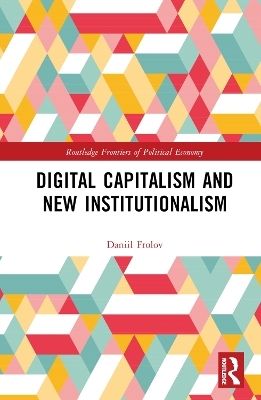
Digital Capitalism and New Institutionalism
Routledge (Verlag)
978-1-032-21236-4 (ISBN)
Daniil Frolov is a Professor of Institutional Economics at the Volgograd State Technical University, Russia. He was awarded the Leonid Abalkin Prize for institutional and evolutionary economists by the Centre for Evolutionary Economics (Institute of Economics, Russian Academy of Sciences).
Contents
Preface
Acknowledgments
Introduction: understanding the institutional complexity of digital capitalism
1. Toward a complexity-oriented institutional economics
1.1. Institutional economics at peak and in midlife crisis
1.2. What is lacking in modern institutional analysis?
1.3. Exploring institutional complexity: methodological pluralism plus post-disciplinarity
1.4. Why do we need new philosophical foundations?
2. Really, what are institutions? (beyond Occam’s chainsaw)
2.1. Institutions as rules of the MMO games
2.2. Institutions in flux: institutional logics and combinations come together
2.3. Institutions and their stakeholder communities
2.4. Digital materiality of institutions: artifacts, interfaces, metaverses
3. Institutional complexity matters!
3.1. The Great Complexification of institutions
3.2. Irreducible institutional complexity
3.3. Digital institutions as escaping hyperobjects
3.4. Parallax: beyond the individualism-holism debates
4. A Post-Darwinist paradigm of institutional evolution
4.1. Institutional complexity beats Darwinism
4.2. The extended evolutionary synthesis and institutional evolution
4.3. From stones to processes: a fluid ontology of digital institutions
5. Cognitive institutions in digital environments
5.1. Toward enactivist view of cognition (and artificial intelligence)
5.2. What are cognitive institutions?
5.3. Cognitive institutions and ecological rationality
6. Digital institutional co-production
6.1. Performativity, bricolage, kludges
6.2. Co-production of institutions: niche-construction perspective
6.3. The COVID-19 and co-production of cognitive institutions
7. Institutional assemblages of digital capitalism
7.1. Assemblage: a new way of thinking about institutional systems
7.2. Blockchain as an institutional assemblage
7.3. Assemblage and the smart city: institutional logics under digital skin
8. Effectiveness of digital institutions: from transaction costs to transaction value
8.1. Transaction costs as frictions in an increasingly frictionless world
8.2. Toward a theory of transaction value
8.3. Blockchain and transaction value: how intermediaries survive transaction costs revolution
9. Digital institutions: wrong or weird?
9.1. Institutional anomalies are not bad institutions: relativistic view
9.2. From deviations to variations, from institutions to extitutions
9.3. Robot rules: a case of post-anthropocentric extitutions
9.3.1. What are robots – products, natural entities, or neighbors?
9.3.2. Flat ontology and co-production of robot rules
Conclusion
Index
| Erscheinungsdatum | 21.12.2023 |
|---|---|
| Reihe/Serie | Routledge Frontiers of Political Economy |
| Zusatzinfo | 3 Tables, black and white |
| Verlagsort | London |
| Sprache | englisch |
| Maße | 156 x 234 mm |
| Gewicht | 600 g |
| Themenwelt | Sozialwissenschaften |
| Wirtschaft ► Allgemeines / Lexika | |
| Wirtschaft ► Volkswirtschaftslehre ► Wirtschaftspolitik | |
| ISBN-10 | 1-032-21236-5 / 1032212365 |
| ISBN-13 | 978-1-032-21236-4 / 9781032212364 |
| Zustand | Neuware |
| Informationen gemäß Produktsicherheitsverordnung (GPSR) | |
| Haben Sie eine Frage zum Produkt? |
aus dem Bereich


